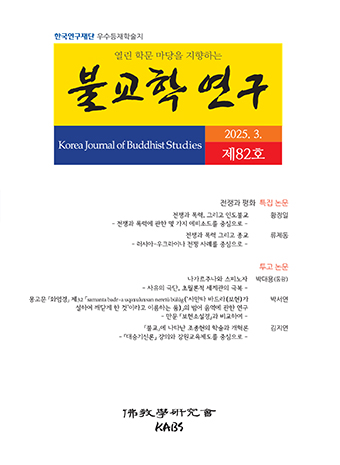Abstract
References
Sorry, not available.
Click the PDF button.
Information
The purpose of this study is to illuminate a point in the aspect of literature history that Buddhist monks had been positive in revealing ‘me’ from the early times compared to the literature in Confucian scholars. What reveals self as the narrative entity and hero is said to be Oriental tradition. However, Buddhist monks didn’t hesitate comparatively to clarify own past, inner world, and journey through travel sketches, letters and others. The works belonging to it are typical in the travel sketches by the monk Hyecho, letter by the monk Uicheondaesa, Yusangi(遊山記) and letter by the monk Cheonchaek, and the letter by the monk Seosan. Among those things, the travel sketches by the monk Self-expression and its Literature-history Significance in Buddhist Priesthood(僧家) Literature Kim, Seung-ho Dongguk University 346 ● 불교학연구 제20호 Hyecho and the monk Cheonchaek allow the hero to be in the position of well reporting directly the strange world as the narrator and simultaneously as the entity of travel. Also, the letters by the Daegakguksa(national preceptor with great enlightenment) and the monk Cheonchaek are clarifying to other person based on self-experience about how the person of first entering the Buddhist priesthood reached the deep world of Buddhism and about what the characteristics in Buddhism are. Finally, the monk Seosan saw the world as a dream, and enjoyed expressing by comparing to the existence of walking aimlessly in it. Given arranging this, heros are shown to be entity in report, transcendental, and sleep-walking. Through this, the Buddhist literature is revealed to mobilize diverse sights even in expressing ‘me’. Writing in this method of seeking for self seems to be one of important characteristics in Buddhist literature, which is distinguished from Confucian literature, as well as being conformed to autobiography in a modern sense.
Click the PDF button.
- Publisher :Korean Association of Buddhist Studies
- Publisher(Ko) :불교학연구회
- Journal Title :Korean Journal of Buddhist Studies
- Journal Title(Ko) :불교학연구
- Volume : 20
- Pages :315~346


 Korean Journal of Buddhist Studies
Korean Journal of Buddhist Studies






